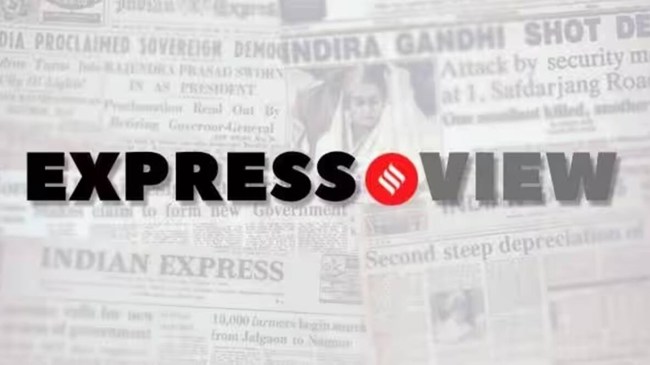Opinion Extension of PMGKAY: Reinforcement of revdis, not welfare
Express View: When voters too turn increasingly transactional and short-termist, that's when the ‘revdi’ culture becomes truly entrenched.
 what the Congress began in 2013 will continue beyond the Modi government’s current term till 2028, with the grain being issued free, instead of the earlier Rs 2-3/kg, the only difference.
what the Congress began in 2013 will continue beyond the Modi government’s current term till 2028, with the grain being issued free, instead of the earlier Rs 2-3/kg, the only difference. One of the Congress-led United Progressive Alliance’s last moves before it was voted out of office was legislating the National Food Security Act (NFSA), 2013. It legally entitled three-fourths of India’s rural and half of the urban population — adding up to 81.35 crore, as per the 2011 Census — to 5 kg of foodgrains per person per month at “subsidised prices”. These were fixed at Rs 2/kg for wheat and Rs 3/kg for rice “for a period of three years”. The Narendra Modi-led Bharatiya Janata Party (BJP) government not only persisted with the NFSA, but made the issue price totally free for a one-year period from January 2023. Further, at a state election rally on Saturday, PM Modi announced that the free grain scheme — now called the Pradhan Mantri Garib Kalyan Anna Yojana — will be extended “for the next five years”. Thus, what the Congress began in 2013 will continue beyond the Modi government’s current term till 2028, with the grain being issued free, instead of the earlier Rs 2-3/kg, the only difference.
The competitive populism isn’t limited to free/super-subsidised grain. In Chhattisgarh, the ruling Congress has been procuring 15 quintals per acre of paddy from farmers and paying an extra Rs 600 over and above the Centre’s minimum support price (MSP) of Rs 2,040-2,060 per quintal for the 2022-23 crop. It is now promising to buy 20 quintals of paddy and pay a price of Rs 3,200/quintal. The BJP, not to be left behind, has guaranteed purchase of 21 quintals per quintal at Rs 3,100/quintal. This raises two questions. The first has to do with the sanctity of the Centre’s MSP: If Chhattisgarh’s paddy growers are paid way above this price, how can the Congress or BJP governments in Karnataka or Uttar Pradesh deny the same to farmers there? Remember, it was the same Modi government that, in 2014-15 and 2015-16, had cracked down on states, including BJP-ruled ones, declaring bonuses on top of the Centre’s MSP on paddy and wheat. Those reforms are clearly history.
Secondly, if rice is procured from farmers at Rs 45/kg (corresponding to an MSP of Rs 30/kg for paddy) and then distributed free (after adding transport, milling, bagging, storage and other costs), how can this be fiscally sustainable? The higher the MSP and the more assured the procurement, there’s greater incentive for farmers to grow paddy and wheat, adding to government stocks that have to be given out for free. This is reflective of a deeper political economy malaise. Governments today find it more expedient to deliver freebies, whether in kind or as direct cash transfers, than investing in public education, healthcare, irrigation or agricultural research and extension that take time to yield results. When voters too turn increasingly transactional and short-termist, that’s when the “revdi” culture becomes truly entrenched.





